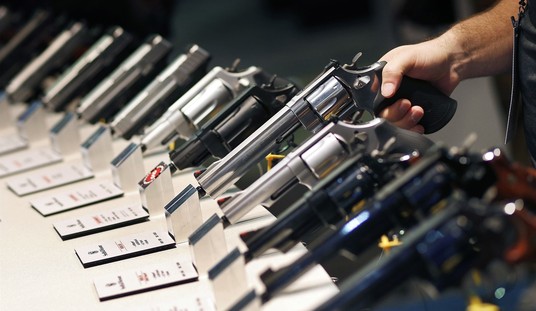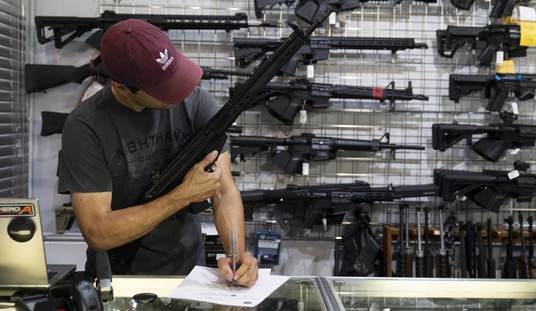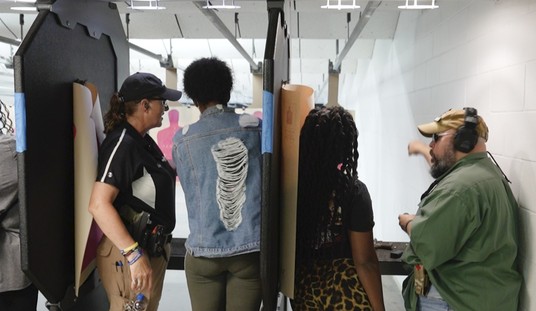Law professors Vikram D. Amar and Alan E. Brownstein have a column in the Los Angeles Times today entitled What The Gun Lobby Gets Wrong About The Second Amendment. A title like that is clickbait candy to me, so of course I took a look at their arguments. What I found was this: Yes, the Second Amendment may be an individual right, they say, but we should still be able to pass almost any gun control law we want.
Of course, a constitutional right does carry with it a strong presumption against government interference with that particular activity, even though the exercise of the right involves a societal cost. We protect freedom of religion, for example, even though we know that some religious practices — like pulling children out of school after the eighth grade — might be considered problematic or harmful.
But there is a critical difference between assigning a high value to a constitutional right when balancing it against social concerns, and arguing that the right necessarily overrides the public’s ability to regulate that activity in ways that may be needed to protect the community.
The problem with that argument is that under the standard articulated by Amar and Brownstein, any anti-gun politicians can simply claim that any gun control measure they adopt is simply regulating the right to keep and bear arms in ways that “may be needed to protect the community”, and that’s all the evidence needed to uphold the gun control law in question. It’s one reason why Second Amendment supporters are eager to see the Supreme Court take up the NYSPRA v. NYC case in early December, because it will allow the Court to actually speak on the standard of review for Second Amendment cases. Despite what the anti-gun attorneys claim, Second Amendment supporters aren’t asking for some special status for the right to keep and bear arms. They’re simply arguing that the courts should consider gun control laws under the highest level of judicial review, known as strict scrutiny. That means the government has to demonstrate that the law in question is narrowly tailored to achieve a compelling governmental interest (in this case, public safety).
At the moment, many courts around the country are looking at gun control laws using “intermediate scrutiny”, a vague and fuzzy middle ground that allows judges to uphold many gun control laws. While Amar and Brownstein don’t come right out and say it, that’s clearly the legal standard they prefer, and in doing so, they consign the Second Amendment to the status of a second class right.
The national debate now has focused on proposed regulations such as background checks and assault weapons bans. Whether specific measures would be permissible under the Constitution depends on their particulars, but the big point is that particulars matter.
In evaluating gun control regulations, it’s legitimate to take into account the social harms and risks arising from individuals keeping, bearing and using firearms.
Constitutional analysis of the Second Amendment, as with other fundamental rights, requires some kind of balancing of interests, which includes considering the state’s need to promote public safety.
And what if you believe the state promotes public safety by securing and strengthening the right of the people to keep and bear arms, which shall not be infringed? Again, simply stating that a gun control law was put on the books for public safety reasons doesn’t mean the public is any safer. You can have good intentions and still make bad law.
For a non-Second Amendment example, consider the recent legislation approved in California that was meant to help freelance writers but is going to screw them over instead.
If a freelance journalist writes for a magazine, newspaper or other entity whose central mission is to disseminate the news, the law says, that journalist is capped at writing 35 “submissions” per year per “putative employer.” At a time when paid freelance stories can be written for a low end of $25 and high end of $1 per word, some meet that cap in a month just to make end’s meet.
Amy Lamare, who writes for money site Celebritynetworth.com and YourTango.com, adds, “Everyone’s freaking out, like my anxiety is going through the damn roof.”
I don’t know why Lamare is freaking out. Sure, her livelihood may be at stake, but the bill’s sponsor says she’s only trying to help. Can’t these writers show a little gratitude?
The overall goal of AB 5, Gonzalez says, is “to protect and preserve good jobs. We’re trying to create new good jobs and a livable, sustainable wage job.” Indeed, freelancers typically do not enjoy employee benefits like paid leave, sick days, health care and retirement benefits, nor are they covered by workplace civil rights laws that prohibit discrimination, and they have less recourse if laws are broken or fees aren’t paid on time (the latter a frequent complaint of freelance journalists). Gonzalez, who previously worked as a labor organizer and says she spoke to “dozens” of freelance journalists while writing the bill and moving it through the lawmaking process, adds that freelancers can be used to break newsroom unions like the ones formed last year at The Los Angeles Times and this year at The Ringer.
As for how lawmakers settled on the 35-submission figure, Gonzalez says that she and her team decided that a weekly columnist sounded like a part-time worker and so halved that worker’s yearly submissions. After protest from some freelancers, the number was bumped up to 35. “Was it a little arbitrary? Yeah. Writing bills with numbers like that are a little bit arbitrary,” she says.
Gun owners know all about lawmakers writing bills with arbitrary numbers in them, just like we know all about lawmakers claiming that they’re putting gun laws in place to protect the public, only to see crime rates increase afterwards. It’s why real judicial scrutiny is needed when it comes to the constitutionality of gun control laws, instead of what happens all too often these days; judges simply rubber-stamping every anti-gun law that ends up in front of them. The best of intentions can still lead to the worst results when government gets involved.









Join the conversation as a VIP Member